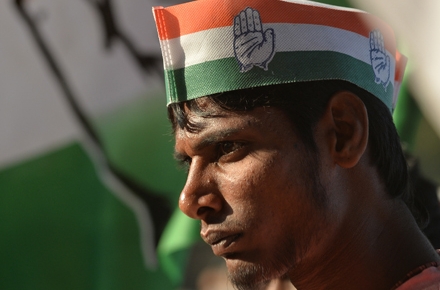India votes
The largest vote in history kicked off on Monday with the start of India’s national elections.
More than 500 million voters will head to 930,000 polling booths across the South Asian nation over the next month to make their choice on who will run the country – in what is being billed as a hotly contested battle between the ruling Congress Party and the Hindu nationalist Bharatiya Janata Party (BJP).
Experts from the ANU College of Asia and the Pacific give their insight on what is at stake, the likely outcomes and the key issues which will define this historic vote.
---
Ramesh Thakur
Crawford School of Public Policy
ANU College of Asia and the Pacific
“The 2014 general election could turn out to be a defining event in independent India's history.
“It could mark a switch from the left of centre populist government led by the Congress Party to a right of centre emphasis on efficiency and good governance under the nationalist Bharatiya Janata Party (BJP).
“It could see the emergence of the 18-35 year old aspirational class of young voters as a force in India's electoral politics.
“And it could mark a decisive repudiation of the dynastic politics of the Nehru-Gandhi family at the helm of Congress in favour of the decisive leadership promised by the BJP's prime ministerial candidate Narendra Modi.
“The hope is he will bring back much needed measures of probity, vision and competent administration. The fear is he could unleash uncontrollable sectarian violence.”
Dr Ian Hall
School of International, Political and Strategic Studies
ANU College of Asia and the Pacific
“This election is going to be fought and won on domestic issues – on the economy and development, on poverty and inequality. But what concerns most international observers is the possible future direction of Indian foreign policy.
“A victory for the BJP-coalition, led by Narendra Modi, would likely be welcomed by big business in India and outside it, because it would mean further liberalisation of India's economy and opportunities for inward investment in crucial areas, like retail.
“But a Modi win would complicate relations with the United States and other Western states, which have concerns about Modi's alleged involvement in the massacre of more than 1,000 Muslims in communal riots in Gujarat in 2002.
“Moreover, Modi has given only the barest indication of his approach to foreign policy, saying that he will work in the tradition of Atal Bihari Vajpayee, prime minister between 1998 and 2004, best known for ordering India's nuclear weapon tests in the first year of his premiership and attempting to normalise relations with Pakistan.
“Little is known, however, about the details of Modi's thinking, nor about his possible approach to the crises that might arise in India's relations with China or Pakistan.”
Dr Paul Kenny
School of International, Political and Strategic Studies
ANU College of Asia and the Pacific
“Corruption and the economy are two of the major issues for voters in this election.
“Partly in response, polling data suggest that the right-leaning BJP will be the largest party in the next Parliament. Although the BJP failed to put forward a clear policy manifesto prior to polls opening, it seems clear that if it leads the next government, it is likely to pursue extensive deregulation, especially in the financial and manufacturing sectors.
“While this will provide a boon to the Indian economy, corruption and inequality may get worse before they get better, leaving many voters disappointed.”
Professor Raghbendra Jha
Australia South Asia Research Centre
Crawford School of Public Policy
ANU College of Asia and the Pacific
“India has been suffering from ongoing ‘grand’ corruption, and that is what is really troubling many people in the country.
“There have been allegations involving politicians taking mind-boggling sums of money in the tens of billions of US dollars in government contracts.
“In the popular mind, while the people are struggling to buy the tomatoes and potatoes due to inflation-generated high prices, politicians are seen to be taking tens of millions of dollars from their pockets. So in my view there is a bit of resentment against the present situation and there’s going to be a backlash.
“Corruption is also affecting the Indian economy and governance. Many government officers are unwilling to take decisions, because they think they will be accused of bribery and corruption. So basically governance has slowed down considerably, and that is primarily why the Indian economy has slowed down in recent times. It has gone from growing at seven to eight per cent to sub five per cent.
“In terms of relations with Australia, no matter which party comes to power the new government will be more decisive than the previous one. Therefore we expect many trade deals which Australia and India have in the pipeline to go through faster.”'
Want to know more about Indian politics, history, society and culture? Check out our new, free Massive Open Online Course (MOOC) 'Engaging India' run through edX. Find out more and register here.







